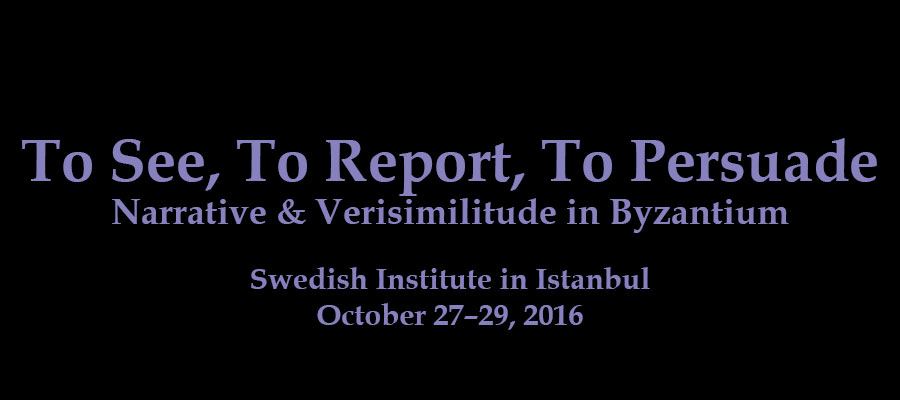To See, To Report, To Persuade: Narrative & Verisimilitude in Byzantium, Swedish Institute in Istanbul, October 27–29, 2016
An increasing interest in narrative practices has in recent years led scholars within the field of Byzantine studies to explore the narrative techniques employed by the Byzantines. These explorations have, so far, focused on fictional texts or texts that employ fictional and semifictional strategies, such as novelistic and hagiographical narratives or ‘novelistic’ chronicles and poems, and they often take as their point of departure the shared rhetorical tradition that formed the basis of Byzantine education for more than a millennium.
In this conference we propose stepping away from defining a distinction between fictional and historical Byzantine texts, and instead to look at narrative as a literary form that allows authors to communicate their experience in a believable manner – whether the events they report are conceived of as truthful or not. The reality of fiction, or the relationship between fiction and reality, is accordingly not the focus of this conference. Rather, the various devices and techniques that enable the narration of events – whether fictional, historical, or documentary – appear to be persuasive and trustworthy. Briefly: we wish to take the concept of verisimilitude – cultural as well as generic – beyond the boundaries of fiction.
We therefore invite abstracts for papers that explore the use of various narrative practices in Byzantine texts from the perspective of authors and their contemporary audiences, as well as post-Byzantine readers. We define narrative broadly to include, in additional to traditionally narrative texts, epistolography, philosophy, rhetoric, commentaries and poetry.
Questions that might be addressed include:
- What is the relationship of narrative production in Byzantium to the ‘real?
- How does the literary form affect the ‘truth’ of historiographical or documentary writing?
- How does any given narrative relate to the lived experience of the author or the lived experience of the reader – either a Byzantine reader or a modern one?
- Are narrative and experience opposed, complimentary, or intertwined?
- Where does persuasion shade into deception or falsehood, and is this a problem – for Byzantine authors or for Byzantinists?
- What are the limits of what can be regarded as narrative?
We are, of course, happy to consider any further suggestions, especially those addressing methodological and theoretical concerns.
